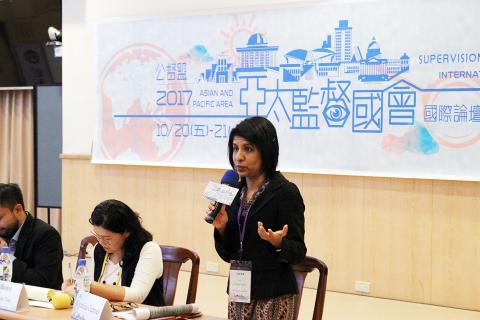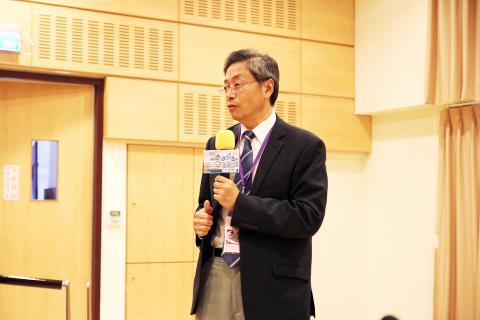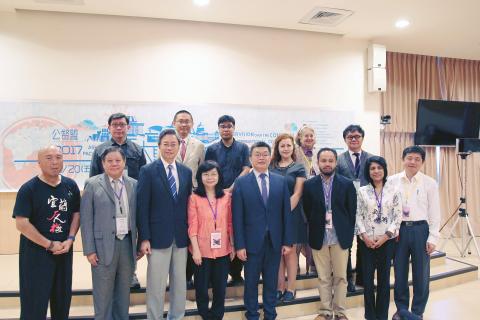The legislature needs to find ways to make it more appealing for the public to keep track of what it does, panelists said at Supervision over the Congress International Conference.
“We need to remember, not everyone is a political animal,” said Shih Hsin-min (施信民), former chairman of Citizen Congress Watch.
The conference, which was held at Soochow University last Friday and Saturday and brought together academics from across the Asia-Pacific region, was a lively discussion on a timely topic that aired concepts of government transparency as varied as the backgrounds of the speakers themselves.

Photo Courtesy of CITIZEN Congress watch
The government is planning to have comments appear on the Web site in real time, so that the public can share their thoughts and feedback on the legislative session, former premier Simon Chang (張善政) said.
Shih said creating a system that ranks the best parts of legislative sessions would make it more appealing to the public.
“A viewer rating system could allow users to judge the quality of dialogue,” Chang added.

Photo Courtesy of CITIZEN Congress watch
TRANSPARENCY AND DEVELOPMENT
Guest speaker Cynthia Gabriel, founder of the Center to Combat Corruption and Cronyism, is based in Malaysia and sees government transparency as pivotal for the region’s development.
“If parliament is not monitored and held accountable, we’ll have a case of creeping authoritarianism,” she said, citing the 1Malaysia Development Berhad corruption scandal which has mired Malaysian Prime Minister Najib Razak in controversy in recent months.

Photo Courtesy of CITIZEN Congress watch
“The entire scandal has engulfed the nation,” she added. “He [Razak] is using public institutions to protect himself and his private interests.”
Gabriel said this is a serious transgression that has threatened parliamentary immunity.
“Even though [the Malaysian government] is hiding information from Malays, other neighboring countries are investigating,” she said.
Fellow guest speaker Donal Fariz, from Indonesian Corruption Watch, said sharing experiences is key to better understanding the common challenge of corruption.
“Corruption is a transnational crime,” he said.
NEW SOUTHBOUND POLICY
Gabriel added that in a globalized world, citizens of other countries have a role to play in exposing the corruption of other governments, particularly those within one’s own region.
“The nexus between business and politics is an important one,” Gabriel said, in response to a question regarding Taiwan’s New Southbound Policy and government transparency.
“Taiwan is disadvantaged geo-politically... Although it’s track record is by no means perfect, it defends it’s democratic values and must espouse them when it does business abroad,” she said.
Fariz said he meets a lot of Taiwanese business people in his hometown of Jakarta these days, attracted by the infrastructure projects kicked off by current Indonesian President Joko Widodo.
“Transparency combats corruption and a corruption-free environment is the foundation for investment,” Fariz said. “That’s why it’s so critical.”
HISTORICAL EXCEPTIONS
Linda Gail Arrigo, an assistant professor at Taipei Medical University’s College of Humanities and Social Sciences, attended the conference to raise concerns over what she sees as the government’s misuse of privacy laws in blocking the release of historical records.
In response, Chang said this may be a case where the legal statutes conflict.
“There is considerable resistance on the part of government ministries,” Arrigo said. “Even if they are released,” Arrigo added, “the names on the photocopies are always blacked out.”
The level of government transparency for the present day has improved considerably, she said, but the past remains convoluted and this makes transitional justice impossible.
“How can we refute denials of the 228 Incident if we can’t access the records?” Arrigo said.

US President Donald Trump may have hoped for an impromptu talk with his old friend Kim Jong-un during a recent trip to Asia, but analysts say the increasingly emboldened North Korean despot had few good reasons to join the photo-op. Trump sent repeated overtures to Kim during his barnstorming tour of Asia, saying he was “100 percent” open to a meeting and even bucking decades of US policy by conceding that North Korea was “sort of a nuclear power.” But Pyongyang kept mum on the invitation, instead firing off missiles and sending its foreign minister to Russia and Belarus, with whom it

When Taiwan was battered by storms this summer, the only crumb of comfort I could take was knowing that some advice I’d drafted several weeks earlier had been correct. Regarding the Southern Cross-Island Highway (南橫公路), a spectacular high-elevation route connecting Taiwan’s southwest with the country’s southeast, I’d written: “The precarious existence of this road cannot be overstated; those hoping to drive or ride all the way across should have a backup plan.” As this article was going to press, the middle section of the highway, between Meishankou (梅山口) in Kaohsiung and Siangyang (向陽) in Taitung County, was still closed to outsiders

Many people noticed the flood of pro-China propaganda across a number of venues in recent weeks that looks like a coordinated assault on US Taiwan policy. It does look like an effort intended to influence the US before the meeting between US President Donald Trump and Chinese dictator Xi Jinping (習近平) over the weekend. Jennifer Kavanagh’s piece in the New York Times in September appears to be the opening strike of the current campaign. She followed up last week in the Lowy Interpreter, blaming the US for causing the PRC to escalate in the Philippines and Taiwan, saying that as

The Chinese Communist Party (CCP) has a dystopian, radical and dangerous conception of itself. Few are aware of this very fundamental difference between how they view power and how the rest of the world does. Even those of us who have lived in China sometimes fall back into the trap of viewing it through the lens of the power relationships common throughout the rest of the world, instead of understanding the CCP as it conceives of itself. Broadly speaking, the concepts of the people, race, culture, civilization, nation, government and religion are separate, though often overlapping and intertwined. A government